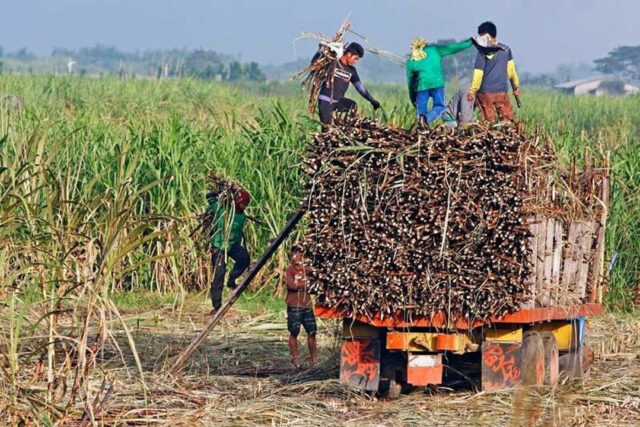As farmgate prices drop, sugar farmers deal with dwindling earnings for their cane harvest

By Adrian H. Halili, Reporter
THE decline in sugar farmgate prices is squeezing small farmers, who have no choice but to take what traders are willing to bid for the cane they harvest from their handful of hectares.
Loreta Inson, a sugar farmer from La Carlota City, Negros Occidental, told BusinessWorld that traders offered about P30,000 for the 13 metric tons of sugarcane harvested from her land.
“From our 38.5-hectare farm, we were able to harvest about 13 metric tons of sugarcane…we spent about P25,000 on fertilizer, labor, and hauling,” she told BusinessWorld.
She said she netted between P4,000 and P5,000 from the sale.
“Whatever is left we would use it again for capital because sugar prices are low… If prices were steady, maybe we could break even,” she said.
Ms. Inson said that with the onset of the dry conditions brought on by El Niño, yields are likely to decline.
Farmer incomes are on the line with every government decision to import sugar, adding to the supply of the commodity, which in turn reduces their bargaining power with the traders buying their crop.
The government, in turn, blames high sugar retail rices for its import decisions, suggesting that it has had to weigh the interests of producers against those of consumers.
Against this backdrop lie allegations of price manipulation somewhere along the supply chain, with the low farmgate prices not showing in the retail selling prices.
Vimaca Farmers Producers Cooperative Regional Manager and Corporate Secretary John Pedrosa said imports are mainly behind the decline in selling price for raw sugar.
“At the start of milling season, there were about 10 million bags of refined sugar with an additional of 2 million coming in, so you can just imagine how its going to affect the prices (at the farm level). There are excessive imports of refined sugar and it has also affected the cost of raw,” Mr. Pedrosa told reporters in a briefing organized by the Sugar Regulatory Agency (SRA) over the weekend.
He said importers are selling the commodity at a much lower price than domestic sugar, reflecting the more efficient sugar industries of the source countries.
As such, imports effectively deny domestic farmers access to a segment of the consumer market, leaving Philippine farmers to sell mainly to processors, the main market for raw sugar.
He said instances of “failure of bidding” are not uncommon if the prices offered by traders are too low.
“Sometimes we just give advances to the planters so that they have money for the next bidding round; that’s the worst-case scenario,” he said.
The SRA reported that raw sugar is trading below its target of P3,000 per bag. Raw sugar is averaging between P2,500 to P2,700 per bag.
SRA Administrator Pablo Luis S. Azcona said that even though farmgate prices for sugar are declining, retail prices remain stable.
Mr. Azcona added that the SRA is also looking into possible price manipulation, ordering an investigation into sugar held in warehouses.
The SRA last week, delayed the release of about 150,000 metric tons of imported sugar to ensure fairer prices for farmers.



